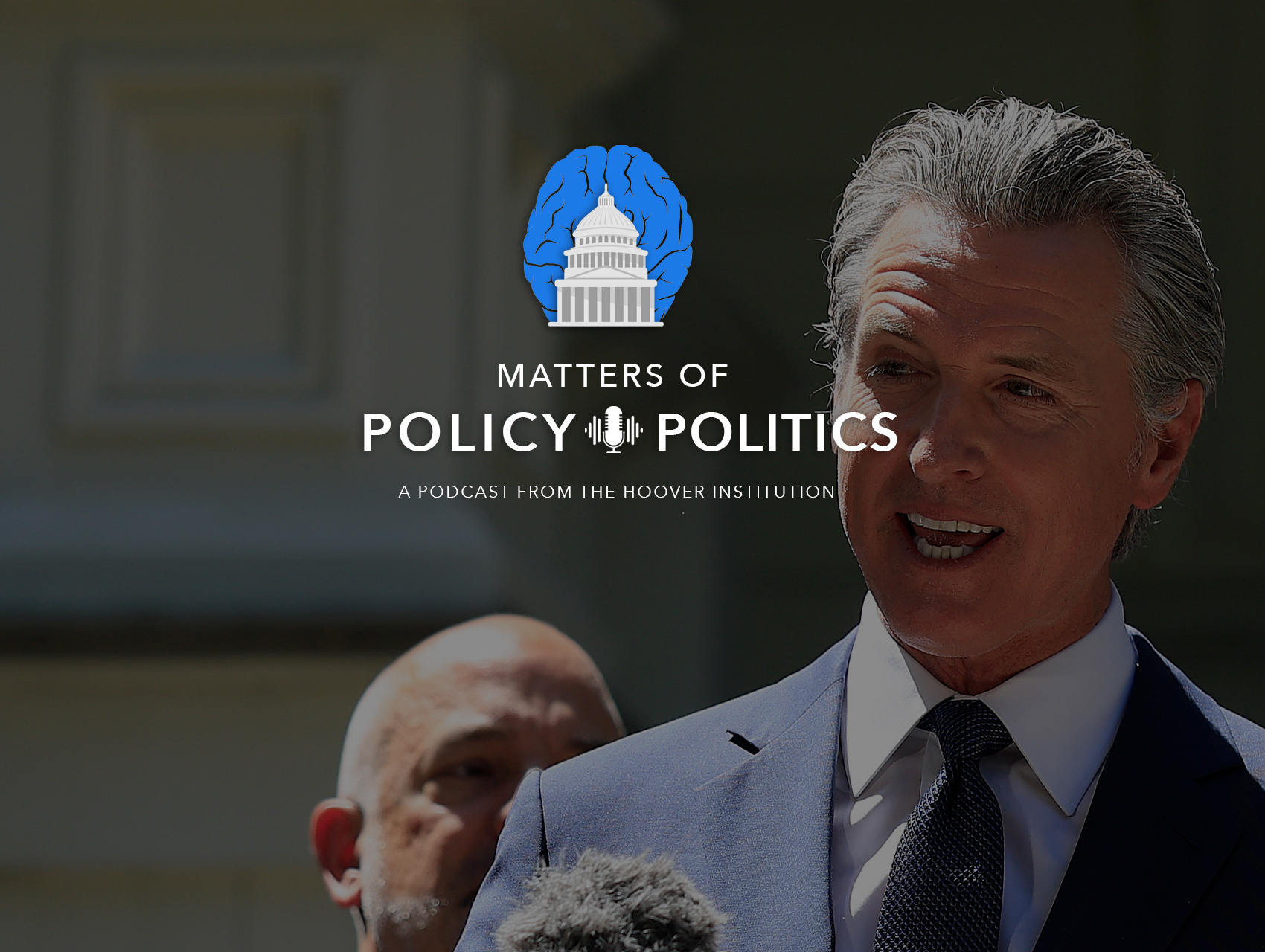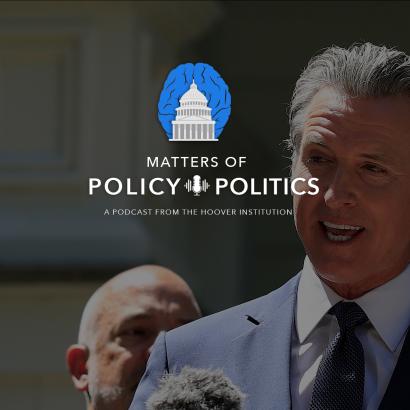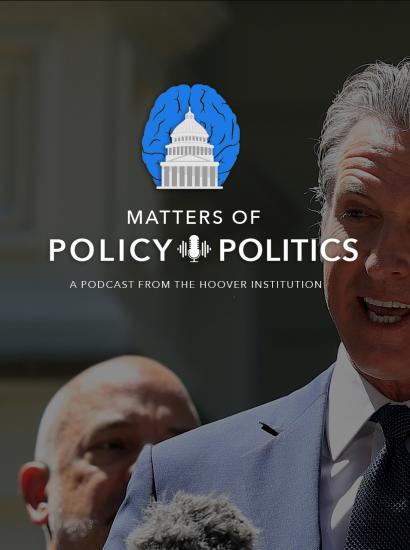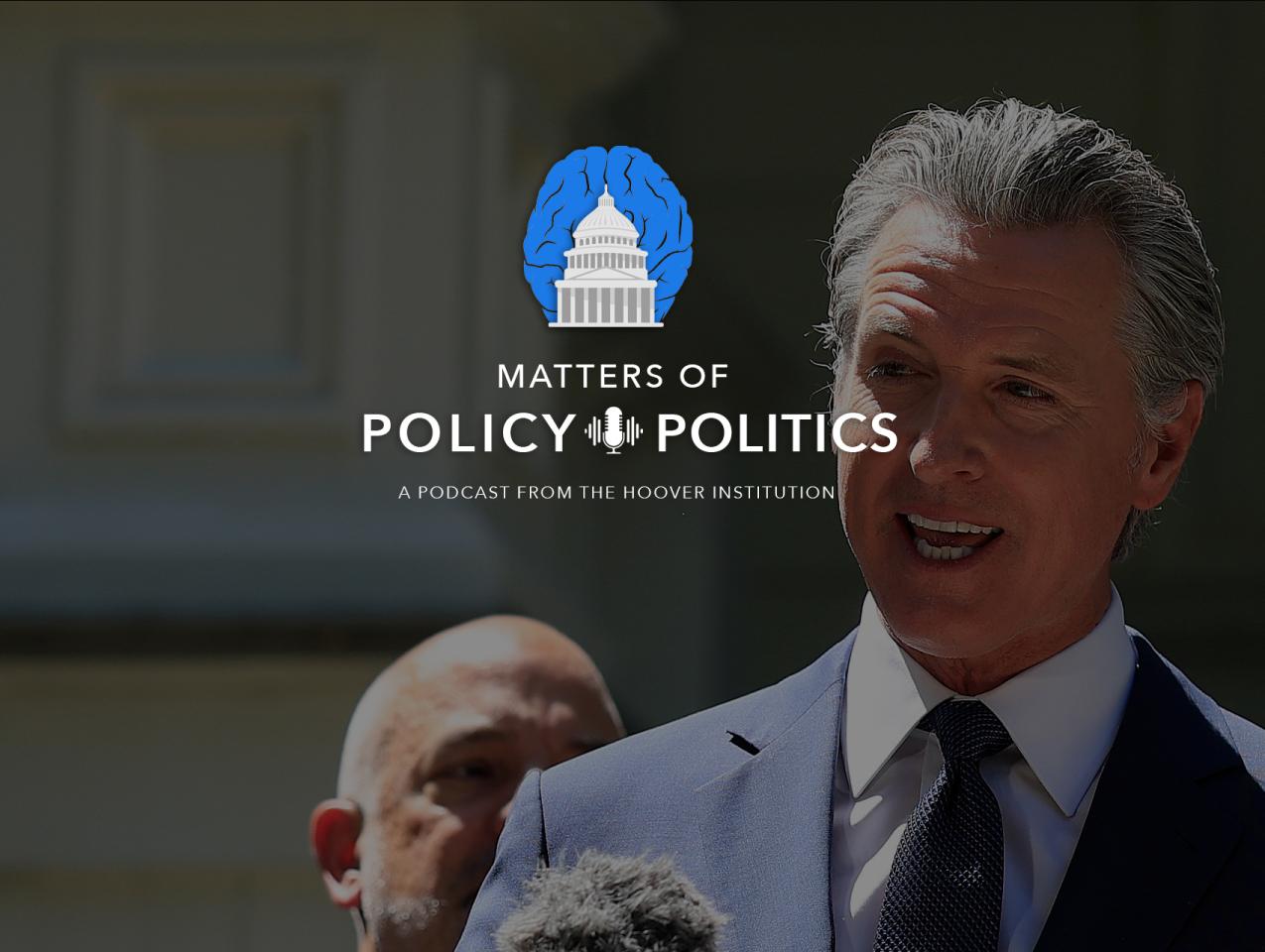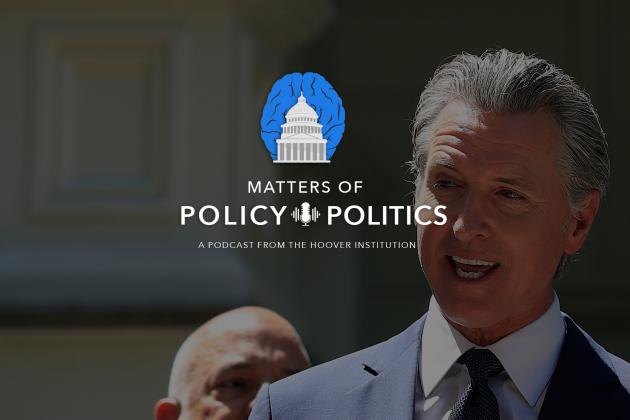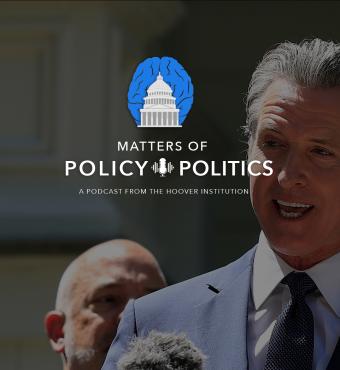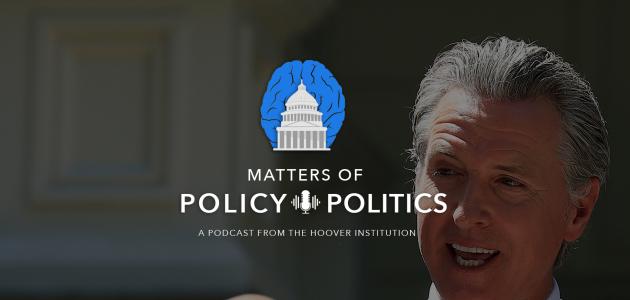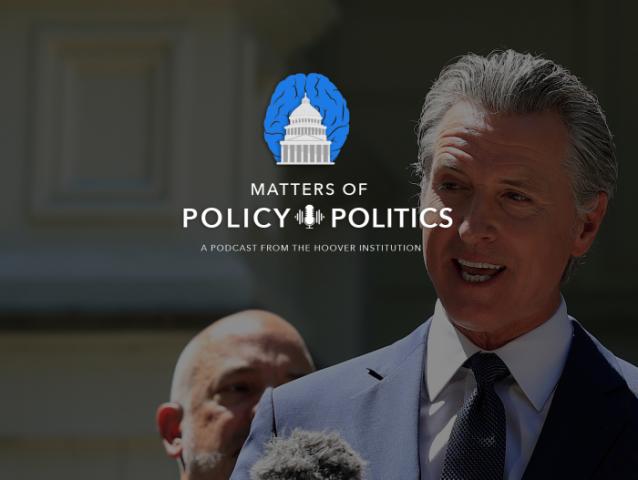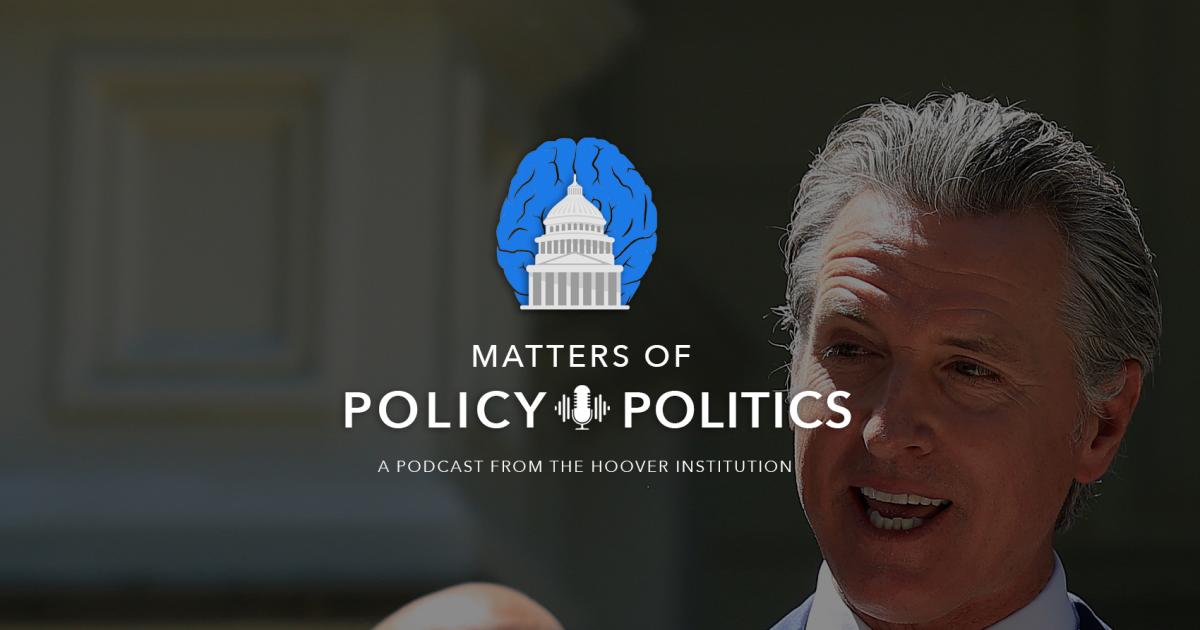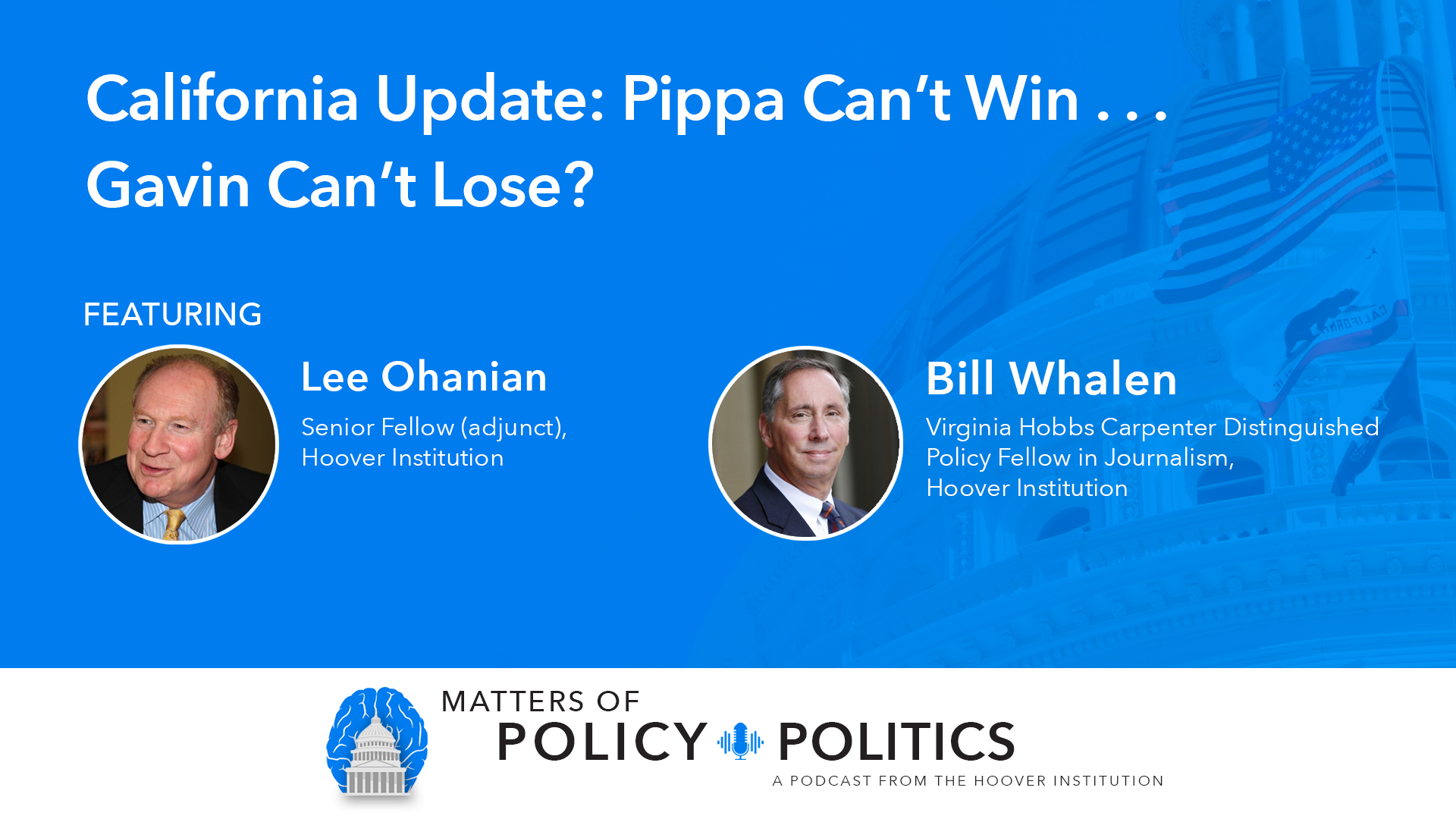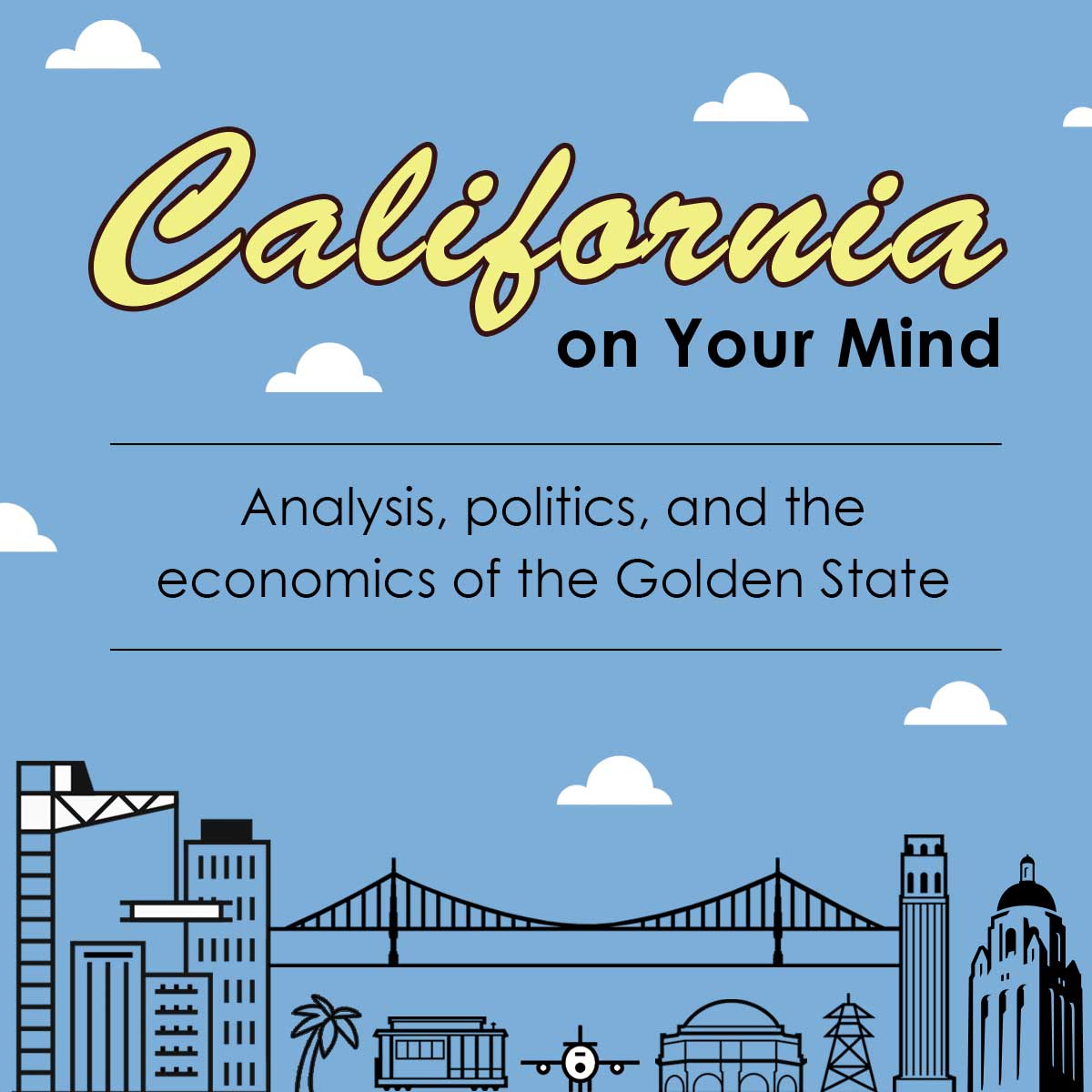- California
- Politics, Institutions, and Public Opinion
The big political news in California: its state legislature agreeing to a Nov. 4 special election to decide whether to temporarily return congressional redistricting to lawmakers – by doing so, California is adding more Democratic House seats and offsetting Republican gains in Texas via that state’s mid-decade redistricting efforts.
Hoover senior fellow Lee Ohanian and distinguished policy fellow Bill Whalen, both contributors to Hoover’s California on Your Mind web channel, join Hoover senior product manager Jonathan Movroydis to discuss election wildcards (Gov. Gavin Newsom’s mixed record as the face of initiative campaigns; former governor Arnold Schwarzenegger as a voice against), what the ballot ploy means for Newsom’s presidential prospects (is he a winner 2028-wise regardless of the outcome?), plus its impact on next year’s gubernatorial race (if voters reject the plan, will Democratic hopefuls ease off democracy-in-danger rhetoric in favor of more tangible concerns like housing and public safety?).
Recorded on August 21, 2025.
>> Bill Whalen: Hi, this is Bill Whalen from the Hoover Institution's Matters of Policy and Politics podcast. The Hoover Institution is proud to announce two national competitions honoring the life and work of Thomas Sowell, one of the most influential public thinkers of our time. For high school and college students, we invite you to take part in the Thomas Sowell Essay Contest.
This is your chance to engage deeply with Sowell's ideas by applying them to pressing issues in society or by reflecting on how his writings have shaped your own view of the world. For creators of all kinds, we're hosting the Multimedia Creator Competition. In a video no longer than three minutes, share your bold and thoughtful response to a simple but powerful question.
And that question is, what lesson or teaching from Thomas Sowell do Americans most need to learn or remember today? Winners in each category will receive $5,000 plus a paid trip to the Hoover Institution at Stanford University for a special celebration in Dr. Sowell's honor. Entries are due by September 15th.
For details and submission links, visit hoover.org thomaspec Let me repeat that for you. Hoover.org Thomas Soul Legacy Good luck. Hope to see you at the Hoover institution.
>> Jonathan Movroydis: It's Thursday, August 21, 2025, and you're listening to matters of policy and politics at the Hoover Institution Podcast devoted to governance and the balance of power here in America and around the free world.
I'm John Mavroydis of the Hoover Institution. I'm sitting in the chair of Bill Whalen, the Virginia Hobbs Carpenter Distinguished Policy Fellow in Journalism, so that he can answer questions and provide commentary about California policy and politics in which he is well versed Bill Whalen, in addition to being a Washington Post columnist, writes weekly for Hoover's California on youn Mind Web channel.
Whalen is joined today by Lee Ohanian, Hoover Institution Senior Fellow and Professor of Economics and Director of the Edinger Family Program in Macroeconomic Research at the University of California, Los Angeles. Ohanian also writes weekly about the policy environment of the Golden State for California on your Mind, hello gentlemen.
How are you both doing today?
>> Bill Whalen: Good, thanks.
>> Lee Ohanian: Good, good to see you fellas.
>> Jonathan Movroydis: Good to see you both. Our show Today will cover three topics. One, the November special election in California. Two, what it means for Newsom and its impact on the 2026 gubernatorial race in the Golden State.
First, let's talk about the special election in California. Lee, in your recent column for California on your Mind, you describe Newsom and the state legislature's plan to redraw district lines in response to Texas efforts to do so. You explained that Both states have been accused of gerrymandering Republican majorities in Tex to give their party an advantage in US Congress ahead of the 2026 midterms.
And California Democrats are trying to do the same. But for California, this require voters to pass Proposition 50, quote, the election Rigging Response act this November. Lee, can you tell us what prompted Newsom and the state legislature's redistricting plan, how the plan would reform California's system of redistricting and whether you think it will be popular enough with voters to pass?
>> Lee Ohanian: Yeah, well, these are as I believe there's an old Chinese proverb that goes, may you live in interesting times. And we live in very interesting times here in California. You know, the backdrop of this is, is really the upcoming 2026 midterms. Historically, parties that win in a presidential election, particularly what we just had with Trump, with Republicans taking presidency, the Senate and the House, historically the midterms are not a good time for the party, for the party in power.
So in Trump's first term, he and the Republicans lost the House, 40 seats swung to Democrats. In Obama's first term, 60 seats swung to Republicans. That was around the time of the sort of mid right conservative Republicans. So right now in the House, I believe there's about a seven seat, seven seat majority for Republicans.
So the House is very much at risk for Republicans. Washington, Washington, D.C. the DOJ and Trump went to Texas and said, hey, you know what, you've had this enormous population growth, perhaps you need to redistrict. And the motivation for redistrict comes from population swings. It typically is done every decade following the decadal censuses.
Texas says we've had so much population growth, 2 million people, roughly 2 million people since the 2020 census. They've concentrated in Dallas, San Antonio and Houston. We've got some districts that really merit being reconsidered for redistricting because Texas argues they were put together in a politically manipulative way.
So Texas is saying, hey, you know what, we're not gerrymandering. We're actually correcting previous mistakes. Now, I'm not endorsing what Texas is doing, but that's what's being advertised. Mid decadal redistricting is extremely right. I don't know when the last time that was done. Governor Newsom comes along and says, well, you know what, democracy is, is at risk here.
Texas is trying to just pad the Republican majority in the House. Well, if Texas moves forward with their plan to redistrict, then California is going to move forward with is redistricting. Now in Texas, the legislature does that. In California. You know, about 15 years ago, we established within the state constitution a nonpartisan citizens Redistricting committee to draw redistricting lines.
So the governor faces the challenge of, we have to deal with the state constitution. So in just the last few days, in a very rushed effort, what the Democrats in California have done have put together a legislative referred constitutional amendment for the November election. And if you're still with me, those of you who are listening at home, this bill, this Pat did, is this up for this is up for a vote today.
Tomorrow is the deadline to get on the November ballot. Is that right?
>> Bill Whalen: Yeah, so note that we're doing this podcast early on Thursday in California. The legislature will consider it on Thursday. Newsom's expected to sign it on Friday.
>> Lee Ohanian: Right, right, okay. So with Democratic super majorities in the state and the assembly, it is almost certainly going to pass.
So we'll go to voters where it just requires a simple majority now. And again, if you're still with me, this is a complicated, this is a complicated amendment to the Constitution. It would change redistricting for the 26, 28 and 30 election cycles and then go back to the citizens Redistricting Nonpartisan commission after 2030.
So there's a lot of complications in place. Politico did a poll of California voters, I believe 64%. Bill, you probably know this much better than I do, but I thought it was 64% that said no to, to the proposed redistricting. But the Democrats in California are advertising this as the need to save democracy.
So there's been if if anyone follows Ashley Zavala. She's the NBC affiliate KCRA in Sacramento. She's investigative reporter, nonpartisan. Great. She's absol. Wonderful. I'd love to follow her. I'd encourage you to to Google her name and watch two to three minute interviews that she did with Gail Pellerin, who is the chair of the elections committee in the assembly, and also Sabrina Cervantes, who is the election chair in the Senate.
Both are Democrats. Those interviews say more in two minutes. Those interviews say more than I can say about the lack of transparency and the political manipulation involved in this. And in fact, neither one was willing to give one name to the reporter of who was involved in this.
And in fact, in the Zavala interview, Pellerin, the chair of the elections Committee, was asked were any members of the legislation involved in drawing these maps? And Pellerin answered, not to my knowledge. And then another question came in that said, well, one of these ACA 8 says the legislature is supposed to be involved in drawing these districts.
So you know, Madam Chair, who drew these maps every day it's who drew these maps. And the Democratic leadership is unwilling to say who did that, and it's obvious why they want political cover. I believe Bill did the Democratic Congressional campaign committee from DC were they involved in this, I saw some reports about.
>> Bill Whalen: That might have been. It's primarily a fellow named Paul Mitchell, not the guy who does hair products, but Paul Mitchell is a consultant who was a genius at, at doing California districts of what Lee has talked about here. So further confusing our listeners. I hope not. So what California is looking at is a November 4th special election, a statewide election and it would piggyback on local election as well.
The cost is going to be an issue here. The 2021 recall election against Governor Newsom that costs the state about $200 million. Why? Because the state picks up the tab for counties in these situations and counties can spend millions of dollars in terms of printing ballots and having to send people to collect ballots and so forth.
But it's these wheels of motion that really kind of make this special. So to do a November 4th special election, you have to. And why November 4th? Because California doesn't have a primary until next June. You don't have to file for a congressional run until March. But if you want to file without spending money, in other words, you want to collect signatures, you could do it as early as December.
So you need to know where the districts are, number one. Secondly, if you do an election on November 4th, California says every registered voter in the state a ballot. Now, they send that out 29 days before the election. But they also send out ballots to military and overseas people 45 days as early as 45 days before the election.
So if you back up, I have it around September 20th that they're going to have to have ballot. So you have to have these districts all lined up on September 20th. And that's the urgency in doing this is kinda down and dirty way and it is down to dirty in this regard.
There is a law in Sacramento that says that normally vetting of legislation there has to be a 30 day period, period. But Democrats have gone around that. Instead they've used a practice called ganda, which stands for gut in the med. What that means is if Assemblyman Mavroidis has a bill and Assemblyman Lahinian wants to do something different, he takes out what is in Mavroidis bill and he dumps in his bill and they vote on Lee's bill and not your bill, even though lawmakers don't know that necessarily voting on.
So that's what they've done here. Now, last night, the California State Supreme Court heard a Republican challenge to this and said, thanks but no thanks. This is part of what's interesting about California and why it's kind of such bizarre land versus Washington, D.C. whereas you have a very a Republican conservative Supreme Court in Washington, which is kind of the backstop against a lot of matters there in California, you have seven members on the state Supreme Court, six of whom appointed by Democrats, three by Newsom.
So that's not necessarily a sympathetic audience. So here we are headed now toward a November special election in California. And gentlemen, we're kind of in this period of hyper politics in California. We've had regularly scheduled elections each year in this decade, with the exception of 2023. It's sort of like in the beginning of this century where you had six statewide elections in the first seven years in the early 2000s.
So I do wonder as we look towards the special election, Lee, when we look at turnout, when we look at messaging and so forth, I think one factor might be fatigue that voters just maybe might be a little tired of politics by the time this comes around.
>> Lee Ohanian: Absolutely, I mean, just when you thought we could take just when you thought we could take a break from politics, of all the craziness of last year, along comes gerrymandering and there's I mean, there's no sense in hiding what California is doing.
It's blatant gerrymandering, now it's being offered as a way of counteracting what Texas is doing. And of course, what in the piece, Jonathan, that you you talked about, that I wrote for California on your mind last week, I noted that this opens the door to what could potentially be a very destructive war among of redistricting.
So Texas is almost certainly going to go forward with redistricting, which means California is going to try based on the November special election. Then what happens if Indiana tries to redistrict, for example, or any other state? I think it's just potentially very damaging and Destructive. And just to give you a sense of how the California map would change, California, California Republicans already have relatively little representation in the House.
Right now they have nine out of 52 seats, which is about 17% of of the House seats. And what I did in that piece is I, I compared state voting patterns in the last presidential election and then compared those state voting patterns to representation by Republicans in a number of states that have least eight House House seats.
And California right now is the second state. New Jersey is the first. It has the second widest margin between those who voted for Trump in California. About 38% of Californians voted for Trump. Only 17% representation of Republicans in the House. If California does do this, the potential could be only four House seats for Republicans out of 52.
Meaning what is that? That's a little bit under 8% representation. And based on what I know about the, we keep talking about the maps. Based on what I know about the maps, here's how the, the composition would change. Right now there are roughly 10 competitive nine. Well, there's roughly nine competitive districts in California, meaning that there's no more than a 10 percentage point difference between Republicans or Democrats.
That's what we see right now, nine competitive districts. The redistricting would drop that from nine to four. The number of Republican fairly solid Republican districts will drop from 5 to 4. The big difference would come in districts where Democrats have between a 10 and 30 percentage point lead.
That would change from the current 11 seats or 11 districts to 24 districts. So it's hard to look at this and be happy, I think, even if you are worried about Trump. In that interview I spoke about with Gail Pellerin and Ashley Zavala, Pellerin, while ducking the question of who drew the maps, started, started a diatribe about Trump and talking about how we live in an authoritarian state and we no longer have democracy.
Even if you think that I don't think this is, I don't think this is healthy. And Bill, I was going to ask you, Governor Newsom is the face of this, at least right now. Governor Schwarzenegger, who was instrumental in the nonpartisan redistricting, the Citizens Commission, he has come out, perhaps not surprisingly, very much against this.
I wouldn't, I wouldn't put Schwarzenegger in the kind of the same camp as the Trump Republicans. He's from a different area. But Bill, I was to going to ask, what do you think when it comes down to Arnold versus Gavin, that could be very interesting. How do you see that evolving?
>> Bill Whalen: I love it. The Governator versus the Gaminator. It's an interesting matchup in this regard. So thanks for teeing this up because I did want to talk about messaging. You mentioned that poll that showed the public supporting the independent redistricting commission. I think Politico and the Citroen center did that poll.
Newsom's poster is pretty privately telling people that this special election will pass, it'll sail through. I suspect that's a product of how they're asking the question of voters, though. But you're probably just framing it in very Trumpian terms. Do you approve this to stop Donald Trump dead in his tracks?
To stop Donald Trump's attack on California, yada yada yada. That probably is a good message. But this is question is going to be how exactly the governor's campaign will bring this forward. He has a lot of talents as a politician. He is telegenic. He gives good speeches. He is kind of very good in this gotcha game, which we should talk about a bit as well.
But he's not a good salesman, necessarily. Ironic for a guy who made money in the wine sales business. Well, if you look at his record going to the ballot. So a few years back he tried to pass a $15 billion education bond called Prop 13. Granted, people were a little confused because they see Prop 13, they think property taxes in California, but that measure got skunked.
Newsom is very much the public face of that measure and it got pounded, and education bonds rarely fail in California. 2024 Lee and Jonathan, he tried to get a 10 billion dollar homeless measure passed in California. Proposition 1 campaign for it made him very much a public face of that.
And Lee, you remember that thing? It took weeks of vote counting to get that thing over the top in a very Democratic state. So putting him as the public face of this measure is risky. I think there's really only one smart tactic, and that is just to run Donald Trump's face constantly in ads.
Make this about Trump, hope that Trump takes the bait and gets involved in the election. But Yuli, you've stumb something very important here. It's the opposition campaign. So former Speaker Kevin McCarthy has said he'll raise $100 million to kill this Charlie Munger, he's the Palo Alto physicist. His father is the late legendary Charles Munger of Berkshire Hathaway fame.
I think he said he'll chip in another 20 or $30 million. That's $130 million. That's, that's spending money in California politics. And they will run ads, and you're rightly the smartest ad they can run is Arnold Schwarzenegger. Why? Arnold is, yeah, he's an anti Trump Republican, but he's verily anti Trump.
He's about reform and about good government at the end of the day. And he is fired up to go after this because this is a big part of his legacy as governor of California, getting this, this thing passed. So, yeah, you could have a showdown between Arnold and Gavin.
And I'm not sure that's a good thing for Gavin, but, you know, we'll get to more Gavin here in a moment. It's just, you know, one thing I just want to emphasize here, though. For all we're, you know, complaining about the process here in California, this is a classic example what's wrong in American politics.
It's always a matter of whose ox is gourd. If you're a Democrat, you're delighted the idea of lawfare against Donald Trump. If you're Republican, you're delighted by the idea of using the Justice Department to go after Adam Schiff now in California. So who's ox gets gored? And in this case, if you're a California Republican, you are outraged and frustrated because you may lose seats.
But, you know, Texas Democrats probably feel very much the same way. So welcome to hardball politics, gentlemen.
>> Lee Ohanian: Yeah, welcome to hardball politics. And you know, in the piece I read last week, I noted that the term gerrymandering goes back to 1812.
>> Bill Whalen: Yeah, Gerrymandering, technically, Elbridge Gerry.
>> Lee Ohanian: Gerrymandering, I stand corrected. And it was the, I believe the governor of Massachusetts who redrew some district lines in Boston.
>> Bill Whalen: Yes.
>> Lee Ohanian: To protect themselves from the Federalists who were the opposition party at that time. So Jerry or Gary, coming from Gary, Elbridge. And then the new district that was redrawn looked like a salamander.
So we have, we have gerrymandering or gerrymandering. And it's been going on forever. I mean, you look at other states, Illinois, I think in the last election, Illinois, I think 43% voted for Republicans. They only have 17% representation in the House. Massachusetts has no representation for Republicans in the House.
36% voted for Republicans in their House in their House elections. And then New York was 43% voting for Republicans in the House. They only have 27% representation. So this is a country that has a long standing principle of one person One vote. And that's been abrogated substantially over time, and in some states more than others.
Michigan. Michigan is very even. I don't know the details and history of how that has worked out, but we would, we would end up having California at 48 out of 52, potentially just being really, really off the charts. So very interesting times.
>> Bill Whalen: This gets very interesting, by the way.
By the end of the decade, the Brennan center, which is a left leaning think tank in Washington, actually looked at what they think the census might come out as in 2030 in terms of shifting populations. And then they red congressional maps around the country. And this is bad news for Democrats as far as national prospects are concerned.
What they figure is under doing their math, they figured Texas would get four more seats, Florida would get three more seats, and California would lose four seats going down to 48. So that's in the electoral College. That's a net shift of 11 right now, adding seven for Republicans and taking away four from Democrats.
And then they projected what it would mean for a Democrat winning in 2032 under this. And they took Kamala Harris's performance in 2024 and figured she would have to win the lone congressional seat in Nebraska. She would have to pick up Pennsylvania, Michigan and Wisconsin, and that would only get her to 200.
She'd also have to add on Arizona and Nevada, and all of that would just get her barely over the top at 272. So you're, you're the Democrats right now. You're looking in the 2000-30s at least of having to run the table in the swing states right now. So, so when you're moving around four seats, you know, this helps Democrats, at least in the midterm, and keeping the House.
Now, the problem here is that as far as this presidential thing goes, what Newsom has proposed is you don't abolish the independent redistricting commission. You just put it in a hibernation, you put it in a timeout, you put it in sleep mode for 2026, 2028 and 2030. Then you go back to regularly scheduled business, independent redistricting in 2032.
And that kind of adds to the cynicism of just doing a timeout on this. So again, we live in interesting times, Lee.
>> Lee Ohanian: Yeah.
>> Jonathan Movroydis: Next up, what does this mean for Gavin Newsom? Much has been speculated about Newsom's run for higher office. He's been to South Carolina, he's obviously term limited.
And there's no room for him in the Senate with two Democrats in there right now recently elected. In appealing to his base, Gavin's put on a tough guy hero act against what he perceives as authoritarianism on the right, while using his podcast to invite the likes of Charlie Kirk and Steve Bannon, which we've talked about on this podcast, to pivot signal to voters nationwide that he can also strike a moderate and conceal your tone.
With that said, does this redistricting overhaul present a massive gamble for Newsom? Should he lose, will he appear as a diminished governor on the national stage, Bill?
>> Bill Whalen: I am very contraried in this regard. First, let me back up a second. We did a little mini conference here after the election here at the Hoover Institution.
We invited both Republican and Democratic pollsters who were out on the field in 2024 to talk about the two parties and their perceptions. And a theme emerged, at least in terms of their take on the Democratic Party. They said the party's problem writ large is perceived as too weak and too woke.
So this explains in part, I think, what Governor Newsom is up to here. He isn't addressing the woke side of things. So he did dance around that on the podcast. As you mentioned, Jonathan, he's going after weakness. Right. And the idea just, well, we're going to try to take down these Alpha Republicans by being alpha ourselves.
I'm not sure if it passes the authenticity test. We'll find out on November 4th whether or not. But that's his thing right now. But I think this is actually a pretty smart move for Governor Newsom in this regard. One of my favorite columns ever written was one written years and years ago.
It was right after the royal wedding of William and Kate Middleton. And the title of the, of the op ed was called Pippa Can't Win. And it was referencing Pippa Middleton, the, you know, very attractive sister of Kate Middleton who was the maid of honor at the wedding and kind of stole some of the thunder from the wedding for her fabulous derriere in her dress.
It became kind of international sensation. And what the column was noting was that after the wedding, Pippa became a celebrity and she started monetizing off it and suddenly she was contracted work with the Today show with NBC and some other things. And the point of the column was that she can't win in regard whatever she does in the business side of things, it will be because of her association with her sister and whoever she ends up marrying in life.
While he may be a wonderful fella, he may find the cure for cancer, he's not going to be the future king of England. So Pippa can't win in that regard. But I would argue Gavin can't lose in this regard. He obviously doesn't lose. If Proposition 50 passes and he gets his way, he's now a hero in Democratic circles.
He may have helped deliver the House for them in 2026. But what if Proposition 50 fails? Yes, embarrassing because it's his baby. Yes, egg on his face. But he'll still get credit with the National Party, with activists, people out there who vote on primaries in 2028 for unlike other governors fighting the good fight and trying to pick up seats for the House.
As for back in Sacramento, yeah, it's, it's embarrassing. But first of all, he's already kind of semi checked out of the, of the job. The national review was kind of summed it up brilliantly. The other day they said unannounced presidential candidate and part time governor Kevin Newsom, he will still have one year left in office and he still controls a lot of influence in Sacramento with the budget process and the legislative process.
So he would be a lame duck, but he could still wield some influence. So I just don't see how he loses this scenario. And again, this gets back to the very cynical nature of all this. He's doing this to get attention. He's doing this position himself. For 2028, poly marketing right now has him at about 28%.
That's double what AOC gets. Now. A lot of that's just based off the current name recognition. But in terms of setting himself up for a run after he leaves office in 2027, I think this is a really smart move on his part.
>> Lee Ohanian: Bill, I agree with you.
It's a smart move. And you know, what I'm looking at is recent polls about his favorability and approval ratings. UC Irvine runs the poll, approval poll. And their latest one, I believe was in July, 59% of those surveyed disapproved of Newsom's job performance. So just take a moment to think about 59% in the blues state in the country, perhaps disapproving of their Democratic governor's performance.
However, when asked about his battles with Trump there, people had a more favorable impression of him. So Newsom is in his seventh year as governor. We spoke many times and about Newsom's ability and performance to move the state forward. And many others have also been critical of some of his policies.
You know, we've gone through many of them in the past. AB5 was one which made it illegal to be an independent contractor. And that, of course, was followed up by Lyft and Uber fighting that spending, you know, over $100 million to fight that. So the governor is, I think, playing the long game.
2028, his timing is perfect for running for president. And so I think this is what he excels at. He's telegenic. Some of what he says, in my opinion, some of what he says comes across well to voters because he says it with a lot of commitment. I often wor that the depth and substance of what he talks about.
But clearly, people like what he's doing on the left. I think when you, when you think about his future prospects, you know, national politics is a very interesting place right now. Roughly 44% are independents, about 24% of Republicans, about 24, 25% of Democrats. And when you look at last fall's election, virtually no Democrats voted for Trump.
Virtually, no Republicans voted for Harris. You've got this 44% in the middle that narrowly went for Trump in the last election. So I don't think What Newsom is doing now is going to play all that well to those 44% of independents who find, you know, at this point, don't find identity with either party.
If you go back 50 or 60 years, there are very few independents in the country now, it's by far the majority. I don't think his tweets that make fun of Trump and that are coming out of this press office, they're all in capitalized letters. They talk like Trump.
They end with thank you for your attention, with two or three exclamation points. I don't find those particularly compelling. I think most, most parodies of Trump fall flat just because he is Trump. He's been doing this his whole life. Yeah, I do think he's playing to a strength.
I don't know how well it will serve him nationally in the Democrat. You know, the Democratic Party is in such trouble now. Not to say that. I feel. Not to say that the Republican Party is not. But AOC is going to take over from Sanders for, For the progressives.
Newsom is very different than Butijich, he's very different than Andy Beshar, very popular Democratic governor in Kentucky, which is a red state. He's very different from Josh Shapiro in Pennsylvania. So this is his shtick, this is what he does well, but I don't think it will. I don't think it'll be enough for him down the road.
>> Bill Whalen: A concern for news of looking at 2028, Lee and Jonathan would be one of timing, kind of a grape, if we wanna use Newsom's wine analogy. Kind of blushing early in that he's in peak season right now. He's just. He's crushing the other 20, 28 people in terms of attention.
You see the poly market numbers. Politico did a statewide poll the other day where they asked Calif. There was support for president that's within California. He topped former Vice President Kamala Harris, I think something like 24 to 19 or something like that. I'm just guessing numbers here right now, but they named four Democrats in that poll.
Newsom, Harris, AOC and Pete Buttigieg. If I'm Gavin Newsom running for president, I like my odds in that field. That's not a terribly strong field. But the reality, though, is presidential politics don't work that way. You don't look three years out at the field and kind of nail who the nominee is going to be.
Things change, and parties oftentimes look for the new shiny thing, the new as they say here in Silicon Valley. If you've done a poll of Democrats in 2005 after their after the loss of George W. Bush, Barack Obama does not register as a presidential candidate. And yet 2008, they go with Barack Obama.
He do a poll of Republicans after 2013, after the the loss to Obama, Mitt Romney, Donald Trump is not gonna lead the field either. So things change. And I have a sneaky feeling the future of the Democratic Party might not be Gavin Newsom. It might not be one of the other current governors who get a lot of attention, like Beshear, who you mentioned, or Shapiro in Pennsylvania, Gretchen Whitmer in Pennsylv, Pennsylvania.
I would look maybe at West Moore, the governor of Maryland, who is staying out of a lot of these woke battles right now. Very interesting. So Democrats are up in arms because Donald Trump sends National Guard troops into Washington to quell crime. And Democrats are going nuts about authoritarianism and what Governor Moore is doing.
At the same time, he's pointing out, look at what I've done in Baltimore in terms of crime. In other words, he's pointing to a record. I think that's smart long term politics. So Democrats may go for him. They may look at the new governor of Virginia. If Abigail Spanberger wins that election this fall, they may look at the new governor of New Jersey as kind of the next thing, if you will.
Otherwise, I kinda wonder if there's gonna be a little gen turnover. Newsom has been involved in politics. By 2028, it will be 25 years since he was first elected mayor of San Francisco. That is a long time in politics. That is an awfully long record. And if I'm a Democrat making the realpolitik decision of what I want a nominee, having seen what Kamala Harris in 2024 with someone kinda mildly attached to California.
Remember they use this one ad against her on gender reassignment surgery to show she was kind of California out of touch. Imagine what they could do with Gavin Newsom. So that might give me concerns to have to go in Newsom's direction. So yeah, just, you know, he may get a moment in November.
He may be hailed as a, as a hero for the party, but you know, the question will be what does he do after that?
>> Lee Ohanian: Yeah. Best case scenario for, for the governor is that Proposition 53 redistricting that voters appro. Yeah. So that'll be huge for him politically.
But Bill's really interesting when you note that Obama kind of came out of nowhere to win. Bill Clinton came out of nowhere to win in 1992. Highly prominent politicians such as Al Gore and John Kerry did not win. Kamala Harris did not win despite being vice president and God, how much was it?
How much. How much was spent?
>> Bill Whalen: A little over a billion dollars, wasn't it? 107 days.
>> Lee Ohanian: So yeah, so I agree it's way too early. This will be in. So this will. If it happens, it happens in November. That's two years before the race. So those interesting names, the Maryland governor.
Yeah, he's quite popular. Yeah. When you look at the possibility of candidates and whether they can beat Vance or whoever emerges from the Republicans, it's interesting, Bill, it was either yesterday, the day before, the chair of Bed Bath beyond. And who among us? Bed, Bath and Beyond. So I'm having-
>> Bill Whalen: How many times you think Gavin Newsom has been to bed past and Beyond?
>> Lee Ohanian: Yeah, no, I mean my wife, bless her heart, I won't say she dragged me in there, but. But it's been a while, so. So the Bed Bath and Beyond share said we will not open or operate retail stores in California.
California has created one of the most over-regulated, expensive and risky environments for business in America. It's a system that makes it harder to employ people, harder to keep doors open and harder to deliver value to customers. So Bed Bath beyond, of course went through bankruptcy and now they're emerging from bankruptcy and they're opening small retail stores in a number of states.
I believe Newsom's response was something like, we wish you well and being relevant again. And that contrasts sharply with the mayor of San Jose, Matt Mahan. Right. Who is. Bill, he's a Democrat?
>> Bill Whalen: Mayhan is a Democrat.
>> Lee Ohanian: And Mayhem was quoted saying, in response to the bed bathing out statement, Mahan said, this is serious, we're shooting ourselves in the foot.
We need to acknowledge that San Jose is open for business. We are doing everything we can to make it easier for our employers to succeed. So.
>> Bill Whalen: Right.
>> Lee Ohanian: That's one Democrat versus the governor is saying, we hope you become relevant again. And yeah, statements like that just, they just aren't going to play well with the middle.
I don't think they will play all that well with almost anyone. The governor gets. He gets very bristly when anyone criticizes the state or criticizes his policies. And I think politically he would be better off to get out in front of this because there are so many visuals to show just there's some wonderful visuals of California.
Those aren't going to emerge in 28. They will be visuals of San Francisco in the Tenderloin, Venice, California and homelessness. It's not gonna be a pretty site. And I think the government be much better at getting in front of those issues than. Because those are going to be.
Those going to be very, very easy to pin on him.
>> Bill Whalen: Yeah, here's what, here's what they need to think about in terms of messaging. If they want to look at 2028, the fallback position from the governor's office is always California has world's largest economy. Look how many Fortune 500 companies in California.
Look at all the kind of gender stuff. Well, that sure, California is a colossus in that regard. It dwarfs other states in terms of economy, in terms of population. But what it can't point to, Lee and Jonathan is progress. And this is a problem for a presidential candidate, especially a governor.
You need to point to X, Y and Z. That happened under your watch while you were governor of your state. And I'm kind of curious as to what Newsom would do Lee in terms of. If you point out, you know, if you put it to him saying, okay, give me example of three great innovative business Things you did three.
Three companies that attracted to California, you know, under your eight years, and, you know, maybe it could come up with three, but just, that's not the narrative of California right now. So he's got to find examples of progress, not just, not just talk about quantity, but quality.
>> Lee Ohanian: Yeah.
You know, I mean, since. So now in, in the 1980 election, it was Reagan. I won't get the wording exactly right, but it was something like, are you better off?
>> Bill Whalen: Are you better off today than you were four years ago?
>> Lee Ohanian: Four years ago. So, you know, that's been a mantra in politics for 45 years.
What the governor often does when criticized is he turns to spending, because we do spend an awful lot in California and the state budget has risen somewhere around 50% since he became governor. So that's a very substantial increase. So what he'll say in response to criticism is, well, I've double spending on fire protection, and we've increased spending here, we've increased spending there.
So that's often what he will say. And those statements are true. But what's not happening is turning that spending into progress. And what's not happening is just the enormous backlog of infrastructure the state needs to make. The governor's gone all in on, on fighting climate change and banning gasoline cars, which Trump overturned.
We're going to need tens of billions of investments in our electrical grid. We need billions of investments in water conveyance, water storage, wastewater, drainage. We haven't even maintained our existing infrastructure adequately, much less making the need to new investments that the state's going to require going forward. So the governor points to spending as a, as a measure of success, but finding tangible results of that is difficult.
He talked about a Marshall Plan for housing. Housing permits are really not an awful lot different than they were when he took office. He talked about the inhumanity of homelessness. He made a very powerful, moving speech about that. I believe in his 2020 State of the State, homelessness has risen.
What do you sense response to that is that in percentage terms, it's not rising as much as in other states. And, and again, that's. I just don't think that's going to play well with, with that 44 in the middle.
>> Bill Whalen: It will, and this would be another challenge for him running national office.
He is sort of developing a reputation, a narrative. You see it more and more stories now. He's a guy who likes to talk really big ideas. You mentioned homelessness, housing, climate change, but he doesn't follow through on the ideas. It's the execution, the eyes fall short, they go away.
This governor not too long ago wanted to come. Constitutional amendment on gun control. What happened to that? I think he wanted a constitutional amendment on abortion. What happened to that? So he loves big ideas. He likes to get the attention from them, but he doesn't follow through on them.
So, you know, to be continued.
>> Lee Ohanian: Yeah, yeah. Many big ideas. I sometimes think about what would have happened if he had just taken one of those big ideas, whether it was housing or homelessness or improving California's K through 12 system, which is, in my opinion, not serving our kids well.
If he had just picked one and said, I've got eight years to get this done, let's see what we can do. I often wonder what would have happened with that. Kudos to the governor for signing legislation that changes CEA significantly for urban housing. We don't have time to go into today, but my opinion is it's not really going to make all that much of a difference.
But I do applaud his, his signing of those bills and his, and his threats to say that he was not going to sign the budget unless CEQA was substantially amended. So that shows what the governor can do. I wish he had done more of that during, and perhaps he will do more of that in his last couple years in office.
But it's a governorship of a lot of the spending and in my opinion, not as much to show for that.
>> Bill Whalen: One final thought just before we switch and Talk about the 2026 race is the quid pro quo of all this. So in politics, you do a favor for somebody you want to favor in return.
You've seen this in terms of getting top 50 through the legislature. One of the districts that gets resigned under, gets redesigned is District 1. This is a very Republican district. Doug Lamafa is the Republican incumbent. This goes from a very Republican district to a very Democratic district. And why is that?
Well, that's because Mike McGuire, who is the Senate president pro tem, he wants to run in that district and so they redesigned it to incorporate his area. So that's a quid pro quo. But what I'm concerned about is the people putting the money behind this campaign for the governor.
He's going to get some very wealthy individuals. I think one fellow down in Los Angeles has already chipped in a couple million dollars. But you look at the governor's press conference the other day, it's the usual suspects. It's seiu, it's, it's, you know, it's the teachers, units, all the people, the public employees get behind the governor.
They're gonna give him money, they're gonna want something in return. So that's going to be one of the narratives in 2026 if this thing does go through. What is the quo for the. What is the quo for the quid?
>> Lee Ohanian: Yeah, what is the quote for the quid?
And, and yeah, Bill, I just, I don't think that was good visual. I mean, we, we look at this stuff closely. Most voters don't have the, don't have the time to, to do, to do that as much as we do. But the SEIU and teachers unions aren't there for, for the principle of fighting democracy, in my opinion.
They're there because the status quo leadership is very favorable for the SEIU and for teachers unions, and they do not want to get the apple cart upset. You know, Bill, there was an interesting article run by the Chronicle, San Francisco Chronicle, which is not a conservative newspaper. The title of the article was How Fair Newsom's Proposed California Congressional Districts.
We take a closer look. They're quite critical of this plan. So I don't know what the LA Times has come out with, but Newsom is getting the message that this is going to sail through. It has a chance if it's come, if it's completely pinned on Trump and as you say, just showed the face of Trump in every possible act had and run on that, and only that, because I think if they run on anything else, it'll be a losing proposition for them.
>> Jonathan Movroydis: Gentlemen, this brings us to our third and final segment of the podcast today, and that is propositions. Proposition 50's possible impact on the 2026 gubernatorial race. The race has shifted ground. Kamala Harris decided not to run earlier this month. And Lieutenant Governor Alani Kunalakis has failed from the race, choosing to run for state treas instead.
That leads former Congressman Katie Porter of Irvine as the nominal front runner. Gentlemen, the question is this. What happens to Democratic messaging if Proposition 50 fails? Will Democrats continue to focus on national politics or hone in on issues of housing and crime? Bill, does this open an advantage for moderates like LA businessman Rick Caruso, who you recently interviewed on Goodfellows, which was a great interview, by the way, who seems to be a champion of quality of life issues?
>> Bill Whalen: Yeah, thank you for mentioning Caruso because he may run for mayor of Los Angeles next year. He may run for governor, we don't know. But if he runs for governor, he is a Democrat, but he's a Democrat by way of having been an Independent and before that a Republican.
And there are a handful of Democrats already running. So I don't think strategy dictates that he tries to out Democrat the Democrats. He's gonna have to build a different coalition of Democrats, but also independents and maybe a few Republicans. A problem solving caucus, if you will. So my theory is this.
If Prop 50 goes down, it might be a combination of Arnold Schwarzenegger, maybe a little toxic Gavin Newsom, just maybe people think this is a bit too much like in the independent commission turnout and so forth, but it might cause Democratic candidates to kind of reconsider just the, you know, abject Trump bashing, that there are other things going on in California besides Donald Trump.
And you know, they should have gotten a whiff of this in the 2024 Proposition 36, the Anti Crime measure. It won in every county across California. That rarely happens for a ballot initiative. It was opposed by Governor Newsom. He and the legislature tried to try to make an end run around it by passing bills.
The legislature is supposedly the same, but not the same. That's a message if I'm Democrats and I need to wake up and pay more attention to salient concerns. So that's a limit of Trump bashing. But as we look at the 2026 field, two things stand out. One, this is a very different election compared to the last two governors races in this regard.
Katie Porter, if you look at early polling, she's the front runner. It's 18% though it is hardly lapping the field. It's hardly dominant. If you take the two Republicans running against her, Steve Hilton, the former Fox News commentator, and Chad Bianco, he's the Riverside county sheriff, they combined get about 19%.
I think Hilton gets 14% of that. So right now would be a Porter Hilton runoff, if you will. Caruso maybe changes the math on that. But we'll see how Porter does with this if she holds up as the, as the front runner. So just very curious in that regard.
But it's, you know, the public's not paying attention to the 2026 race right now and that's in part because the special election steps on it. But I'll be curious to see how these Democrats do talk about the state of California moving forward. They'll be nice to Governor Newsom.
They're not going to throw them under the bus or criticize just as Newsom didn't criticize Jerry Brown. But there are a lot of things they need to, you know, address in terms of soft underbelly California because as Lee mentioned, Newsom's numbers aren't great. And I can tell if you have you looked at polls, California for the past 15 years, the state is constantly on the wrong track when it comes to that question of voters of right track, wrong track.
People think there's something off here. So let's see if Democrats at least acknowledge that something is off.
>> Lee Ohanian: Yeah, the interesting for the 26th gubernatorial race, Katie Porter is in the lead and you know, she ran for US Senate against Schiff and Steve Garvey and some others. She didn't really get any traction in that race at all.
It ended up being a runoff between Garvey and Schiff, Schiff winning very easily. You know, what strikes me interesting Bill, about California politics is that it is such a super majority state that within the state's Democratic Party they can do the leaders of the Democratic Party can just do an awful lot of things almost with predetermination.
I mean, years ago Kamala Harris, Gavin Newsom were the rising stars. Kamala slated into the Senate. Newsom went into lieutenant governor and then governor. So Porter lost, in my opinion, because, you know, Schiff had an awful lot of money. He had Pelosi's endorsement, as I recall. So there's just, you know, it's interesting because there's a, you know, a handful of people in the state Democratic Party.
Willie Brown is one of them. And I found it surprising. You're, you're, you're much more deeply into state politics than I am. But I found it surprising that Brown, essentially, he said before Harris chose not to run, he said that. I parse from his statement, I like Rick Caruso.
I don't think this is the right job for Kamala. I found that so striking because Caruso, he is a Democrat, but he's not considered inside the full Democrat. He was in the LA election for mayor, which Karen Bass won. And many people now, I suspect, you know, wish they had voted for Caruso because he was in the Palisades when it was burning.
She was in the country of Ghana. Hillary Clinton, Joe Biden, Barack Obama, all campaign for Karen Bass. And I think one reason because is that she's been a lifelong very, very true Democrat in Crusoe. Has not been. But I found that. I found that I found those words from Willie Brown, who is.
>> Bill Whalen: Willie likes being around money. So clarify that. There's a very funny story that I'll tell you when the podcast is over about that because I don't want to slander him, but the very funny story nonetheless, but, you know, we will see exactly. One thing that does stand out here is Kamala Harris and just really kind of what weak genes she has in California.
So she carries the state, obviously in the presidential election. She was the, you know, front runner for the governor's race. Terms of name recognition, pretty much. But then she doesn't run for governor, and then that poll comes out showing her trailing Newsom inside of California. This is a really astounding thing when you look at it.
Vice president sitting. Vice presidents usually have a pretty easy shot at getting the party's nomination. If you handle that job right, you've done a good job of, you know, building up. I use and chits people, you know, like the office and so you can get the nomination. But former vice presidents, to kind of tumble that far that fast shows you that she really does not have a hold on the California Democratic Party and the national party for that measure too.
So again, this kind of adds to the open Question of Democrats moving forward. You know, it's. There was no Jerry Brown successor in 2018. Jerry Brown was kind of a unique act. Now, there could be a Gavin Newsom follower in terms of style, but we'll see if any other Democrat mimics that.
Or again, if they look at the polls and decide that, you know, voters are hungry for a little something a little different. But you know what, Lee? It is a super majority party state, and if a Republican ends up on the ballot, then, you know, it doesn't matter what the Democratic does pretty much.
And that's one thing I'm looking at with Prop 50. You know, I'll start running my mouth after this. It's potentially a very good moment for Steve Hilton. Why? Chad Bianco kind of has the Trump lane in terms of being strong on immigration and kind of very Trumpy in his, you know, kind of, you know, sort of cowboy presentation.
Hilton, on the other hand, is kind of running a little more cool policy, intellectual campaign. And he's promised that if Prop 50 passes, he will go to court to try to kill it in court. So it's a ticket to ride for him in terms of getting Republican votes.
But again, this is the Pyrrhic victory that is California politics. If you're a Republican, you win the primary, you're pretty much dead water in the general election, which gets to yet another tactic. Will someone like Katie Porter, she feels that she's in a good first place position, will she use her money to elevate herself to make sure she finishes first or second?
Or if she's confident in finishing first or second, does she do what Newsom did in 2018, pour a lot of money into attack ads against a Republican rival, figuring that will elevate the Republican and get that Republican as your, as your opponent in the general election.
>> Lee Ohanian: I wasn't so surprised Harris withdrew.
What I can just conjecture about her and her skill set. The governor's job, I don't think would have been a good match for. That's not to be pejorative about the former vice president, but it's become almost an unmanageable task. Jerry Brown, I think many people say he was a very successful governor.
When you talk one on one with him or in a small group of people, he will talk about just the many frustrations he had, the many challenges he faced with the state legislature trying to reform ceqa, trying to reform the state's pension system. Brown was much more, I think, of a pragmatist.
He was not, I would call a progressive Democrat. It's just an extremely difficult job. I don't think it would lead to necessarily higher office for her. I am puzzled by why her numbers are so low here. It may just be because the Governor is in the spotlight every single day now and she is not.
Nevertheless she's, she can, she can raise money very easily and that can do a lot in politics. It is curious about Caruso because he can self finance a campaign. He spent over $100 million of his own money on the LA mayor, on the LA Mayor's race. So if he does choose to run, whether for LA Mayor or for California governor, he has a lot of money, personally, that he can throw that.
And Republicans in the past have often said, you know, we just can't get money from. We just can't get, get money because people assume we're going to lose and therefore we can't get money. We can't run a good campaign and we lose. It becomes a self fulfilling prophecy.
Caruso, even if he's not the most adorned Democrat in the party, he can get a lot of money on his own.
>> Bill Whalen: Yeah. Keep in mind though, money is not a guarantee of success. While Arnold Schwarzenegger is fabulously wealthy and that came in handy for the recall election and his reelection in 2006, Meg Whitman, so enough of that.
But you know, just one final thought on Harrison we can close up. Yeah. It's just remarkable that she, you know, has just kind of fallen this quickly in politics. But I really was not surprised that she did not run for governor. And this is, you know, to the, you know, the proverbial broken clock.
That's right twice a, twice a day. And I was right on this. But I just figured this way. I don't think there's ever been a three star general who wanted to become a lieutenant colonel or a one star general. And when you're vice president going back to being governor of California, unless you really love policy, unless you're just a hopeless romantic when it comes to your home state, you're not going to want to run for governor, you want to run for resident.
And so I just never understood why she would want to kind of punch down from your office, if you will. And maybe Lee, she did look at what a difficult job this is. It's a headache job on a daily basis and maybe just decided that life is short and there's a better path for her.
She does have a book coming out soon. I guess I will buy it and read it. I'm a glut for these things. Final note by the way, the Gavin Newsom autobiography, which was supposed to come out in the spring and then got pushed back to the fall, it's now coming out next February, so stay tuned.
>> Jonathan Movroydis: Great analysis, gentlemen. As always. Thank you for your time. You've been listening to Matters of Policy and Politics, the Hoover Institution podcast devoted to governance and balance of power here in America and around the free world. Please don't forget to rate, review and subscribe to this podcast wherever you might hear it.
And if you don't mind, please spread the word. Get your friends to have a listen. The Hoover Institution has Facebook, Instagram and X feeds. Our X handle is hooverinst. That's @hooverinst. Bill Whalen is on X. His handle is @billwhalenca. And Lee Ohanian is also on X. His handle is @Lee_Ohanian.
Please visit the hoover website@hoover.org and sign up for the Hoover Daily Report, where you can access the latest scholarship and analysis from our fellows. Also check out California on youn Mind, where Bill Whalen and Leo Hanian write every week. Again, this is Jonathan Mavroida sitting in Bill Whelan's chair.
This week he'll be back for another episode of Matters of Policy and Politics. Thank you for listening.
>> Speaker 4: This podcast is a production of the Hoover Institution, where we generate and promote ideas, advancing freedom. For more information about our work, to hear more of our podcasts or view our video content, please visit hoover.org.







